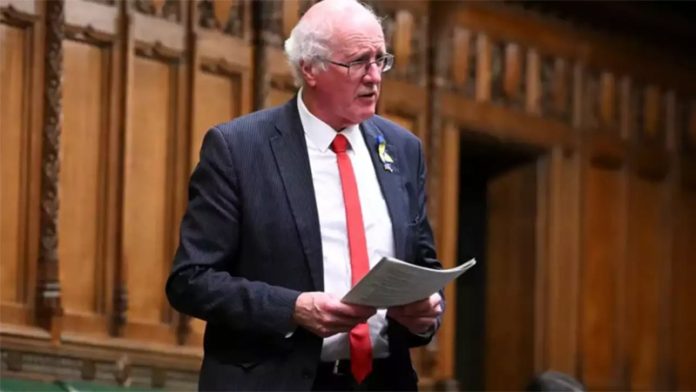LONDON, Dec 1 : Members of Parliament in the UK have raised concerns about deteriorating religious freedom and human rights abuses of minority religious groups in Pakistan during a cross-party debate in the House of Commons.
The ‘Pakistan: Freedom of Religion’ motion was tabled by Democratic Unionist Party (DUP) MP Jim Shannon, chair of the All Party Parliamentary Group (APPG) for International Freedom of Religion or Belief.
He stated that the situation in Pakistan is “critical” and at a “crisis point” due to challenges for its religious minorities and claimed that since the 1980s, many thousands of cases have been reported that disproportionately affect Christians, Hindus and Ahmadis.
“The reality of the situation in Pakistan is dire. It is critical. It is at crisis point. In fact, I can understand why some people feel utterly hopeless,” said Shannon, opening the Commons debate on Thursday.
“Pakistan is a lovely nation, with a rich and diverse history, but it remains fraught with challenges for its religious minorities. Christians, Hindus, Ahmadis and Shi’a Muslims face widespread discrimination, persecution and violence on a regular basis,” he said.
“The legislative and societal frameworks in Pakistan have created an environment where intolerance thrives. If we let something happen once, twice, three times, then 10 times, it becomes the norm. That is what has happened to religious minorities in Pakistan,” he added.
Liberal Democrat MP Paul Kohler noted that the Pakistani government is “far too often” failing to fulfil their basic duty of protecting their citizens in the face of forced conversions and mob violence.
“Even more seriously, there is widespread evidence of the state actively supporting the discrimination of certain religious minorities, including Shia Muslims, Christians and Hindus, with laws against blasphemy in particular being used to undermine their human rights and freedoms,” said Kohler during his intervention in the debate.
Conservative MP Andrew Rosindell highlighted the “close and long-standing” relationship between the UK and Pakistan, as he called on the Labour Party government to carry on the work of the previous Tory administration through initiatives such as the Coalition for Religious Equality and Inclusive Development.
“Unfortunately, Hindus too have been subjected to increasing violence. In July 2023, a Hindu temple in the Sindh province of Pakistan was attacked, and in June 2022, a Hindu temple in Karachi was destroyed,” said Rosindell.
“According to the National Council of Churches in Pakistan, not just since the adoption of the 1973 constitution nor since the turn of this century but annually, as many as 1,000 Christian and Hindu girls are kidnapped. There are also reports of Christian children being obligated to attend Islamic lessons at their local madrassas, while Christian teaching is restricted to the home,” he said.
“I hope that the government are once again raising these concerns with our counterparts in the Pakistani government,” he added.
In his response on behalf of the UK government, Hamish Falconer – Foreign Office Minister in charge of Pakistan – shared that he was recently on a visit to the country and considers Pakistan an “important country, a strategic country, and it is important that we stay engaged in the full range of issues going on in that country”.
Falconer said: “We know that many minorities in Pakistan face injustices, including structural discrimination, economic exclusion and wider social intolerance. I share members’ concerns about the increasing misuse of Pakistan’s blasphemy laws.”
“This government places freedom of religion or belief at the heart of our work in Pakistan, and it was a major part of my visit last week. Pakistan must be open and tolerant, and we will continue to work with its government and all key stakeholders, including this House, towards that end,” he said.
The parliamentary debate concluded with a resolution that the House notes “reports of deteriorating religious freedom in Pakistan; expresses its concern over the alleged widespread forced conversions and human rights abuses of minority religious groups; deplores the lack of action by the Pakistani government, which represents a serious violation of Article 18 of the Universal Declaration of Human Rights; and further notes that the arrest of opposition religious leaders by the local authorities has led to condemnation both in Pakistan and further afield”. (PTI)


